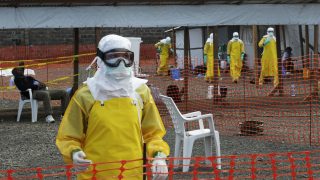Rory Stewart, the UK’s international development secretary, has called on the World Health Organization to declare the Ebola outbreak in the Democratic Republic of Congo an international emergency. According to the Guardian, Stewart is on a two-day visit to the DRC to assess the issues hindering efforts to bring the EVD epidemic under permanent control.
“I would politely, bearing in mind I have no formal locus in this, encourage them (the WHO) to declare this is a global health emergency, and partly because it will make it easier to raise the extra cash,” Stewart told the Guardian. The secretary fears that the crisis may soon escalate beyond numbers that can be vaccinated.
Last month, the WHO declared for the third time that the Ebola outbreak in the DRC does not constitute a Public Health Emergency of International Concern (PHEIC) despite its spread to Uganda. The organization acknowledged that the crisis is critical in the DRC and that it may affect neighbouring regions, but that it is not of global concern just yet.
“… It was the view of the Committee that there is really nothing to gain by declaring a PHEIC, but there is potentially a lot to lose,” Dr Preben Aavitsland, Acting Director, Emergency Committee said on behalf of the WHO last month.
But Stewart has a different opinion, “This is definitely a public health emergency. When you are talking to someone with the disease, health workers are stepping away because even with protective equipment people are contracting Ebola and the stories are heartbreaking,” he said.
He also called on some European countries like France to provide and increase funding for the emergency stating that they haven’t provided as much as the UK and US that have given more than half the funding to control the outbreak in the DRC. “We are critically short of money. There is going to be a funding gap of $100m, and probably of $300m through to December because we have to stay on top of this. It is a very expensive response because the local systems are simply not there,” Stewart said.
Similarly, the WHO called on the international community to step up funding to strengthen the control of the epidemic stating that it cannot tackle response challenges without the international community stepping in to fill the sizeable funding gap. Ironically, the organization put out this call right when it said the epidemic was not of international concern. A declaration of a PHEIC would have pulled in more international funding and resources
Amongst other things, increased funding will help with the much-needed ring vaccination, a vaccination that tracks the likely spread of Ebola by identifying individuals with an increased risk of contracting the disease due to their connection to patients with the virus. This vaccine strategy in the DRC can help reduce the rate of transmission considerably.
The Ebola crisis in the DRC has persisted for a year amidst rumours, conflict, cultural complications and repeated attacks on health workers and facilities. These factors are responsible for the slow pace of vaccination programs and reoccurrence of the disease in areas it is believed to be resolved.
Stewart is concerned that the disease could spread to the densely populated city of Goma, “If it gets into that kind of place, we have a problem,” the secretary said. “Goma is really connected to the world. It has the Grand Barriere heading into Rwanda. It is absolutely vital that we hold it here in Butembo and Beni.”








